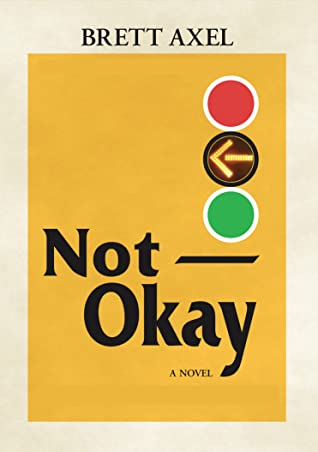
‘I’m not OK. Uncle Will was not OK. The only reason I think the frozen lemonade girl is OK is because I don’t know her. No one is actually OK.’
Peter, the articulate, troubled narrator of Brett Axel’s novel Not Okay, reconsiders and rejects popular 1970s self-help advice while figuring out his own way to recover from child sexual abuse. The strongest part of this title is his voice, how he reasons everything out to himself in full sentences, upfront about his trauma and his shortcomings. He’s got the nonchalance of a survivor who knows he can’t be upset about what happened all the time if he’s going to function, but who knows how to navigate systems to attempt to access the help he needs by letting on about some of his past at opportune moments.
The darkly humorous construct of this book is that the narrator, who survives a truly horrific experience, only has self-help platitudes designed for people with smaller, ‘regular’ problems for guidance. That’s a valid critique even today of some aspects of ‘wellness culture’ that haven’t caught up with the issues facing modern society. I remember wondering, after the police murder of George Floyd, how as a white woman I could be ‘okay’ and ‘enough’ and ‘confident enough to not apologize for taking up space’ while simultaneously holding myself accountable to confront my role in violent and oppressive systems.
We see Peter evolve as a character as he figures out that women he dates, and his female partner, have minds and traumas of their own, and how to have more equal relationships. In one memorable scene, he realizes that if he can handle revenge, he can most likely handle cleaning the apartment. Later on, he struggles with moral questions of how to treat abusers who are genuinely sorry and with the unreliability of memory and his own fallibility.
The plot moves along quickly enough, and I was surprised at times that characters who broke the law could escape detection for so long, but then remembered that it was the 1980s before we had such advanced surveillance technologies.
The setting gave a good sense of NYC/upstate NY/New Jersey in the 1980s, showing our country and all its little quirks and imperfections, such as the ‘F’ in ‘Freedom’ bursting after the rest of the word in a Fourth of July fireworks display. We see the benefits and pitfalls of mental health care, parking and driving in a big city, first jobs and first loves, and making your own sense in a world that offers little direction.
Overall, a heartfelt and thought-provoking read.
Brett Axel’s Not Okay is available here from publisher Vinal Press.
